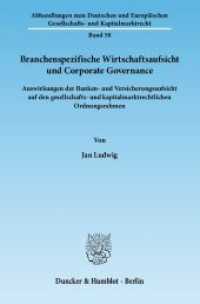- ホーム
- > 洋書
- > 英文書
- > Business / Economics
Full Description
The Emerald Handbook of Sustainable Energy Transition and Social Justice fosters a profound understanding of research and discourse on energy transition across the Global South and deconstructs the current thinking by presenting alternative viewpoints that enhance the understanding and engagement of communities in the Global South in the process of achieving sustainable development. The expertly curated chapters in this handbook focus on sustainable practices, energy use and creation and human rights from the perspective of a range of countries in the global south.
The interdisciplinary nature of the topics covered appeal to readers in a range of disciplines across business and social sciences, as well as those interested in understanding the ongoing complex debate on sustainability, energy transition and social justice.
New Frontiers in African Business and Society book series is dedicated to the exploration of theoretical and conceptual discussions that consolidate conventional knowledge about Africa. The purpose of the series is to invite new reflections on the nature of business and society across parts of Africa. The series contributes by interrogating the socially constructed practices assumptions and beliefs which provide meaning for scholarship across Africa.
Contents
Introduction - Beyond Green Promises: Sustainable Energy Transition and Social Justice; Julius Omokhudu Irene, Bridget Nneka Irene, Regina Frank, and Kingsley Obi Omeihe
Part 1. Green Transitions, Energy Equity, and Environmental Justice
Chapter 1. Green Transitions in the Periphery: Derisking, Dependency, and Alternative State-Capital Relations; Gabriel Kahan
Chapter 2. Investigating Green Colonialism and Energy Justice in the Development of Lake Turkana Wind Power Project in Kenya; Nele Bülow and Chigozie Nweke-Eze
Chapter 3. Energy Equity in the Transition to Low-Carbon Energy Sources: A focus on Natural Gas and Sustainable Development in Nigeria; Julius Omokhudu Irene, Chux Daniels, Bridget Nneka Irene, Kingsley Obi Omeihe, Regina Frank, and Mary Kelly
Chapter 4. Recycling and Recovery Pathways for Solid Plastic Waste in the Context of Sustainable Environment; Piyush Pandey and Avinash Pratap Gupta
Chapter 5. Design and Optimization of Triboelectric Nanogenerators for Energy Harvesting in Rural Communities; Raphael Kanyire Seidu, Emmanuel Abankwah Ofori, George Kwame Fobiri, Benjamin Eghan, and Benjamin Tawiah
Part 2. Governance, Institutions, and Policy
Chapter 6. State Colonialisation of Peasant Communities: State Food Estate Projects between Welfare and Green Deconstruction; Dedy Ilham Perdana, Ahmad Arif Widianto, and Reza Amarta Prayoga
Chapter 7. The role of Institutions in WEEE Management in the Global South; Sunita Dewitt and Elmar Puntaier
Chapter 8. Small-scale fishers and their role in ocean governance in South Africa; Danai J Tembo
Chapter 9. Sustainability and Higher Education: Latin American Perspectives; Eduardo Barros-Guerrero and Andrés Felipe Bueno-Lugo
Part 3. Resistance, Advocacy, and Alternative Narratives
Chapter 10. Rebelling Against Violent Regimes: The Case of Lima's Fog Oases; David Flood Chavez
Chapter 11. Queering Human Rights: Decolonizing Discourses and Resisting Homonationalism in African Contexts; Saymore Masaisai
Chapter 12. Decolonizing' Climate Policy for Self-Sustaining Solutions to Climate Change in Global South; Ajaz Ahmed
Chapter 13. Empowering Indigenous and Local Voices in Climate Advocacy; Kattya Cascante and Xira Ruiz-Campillo








